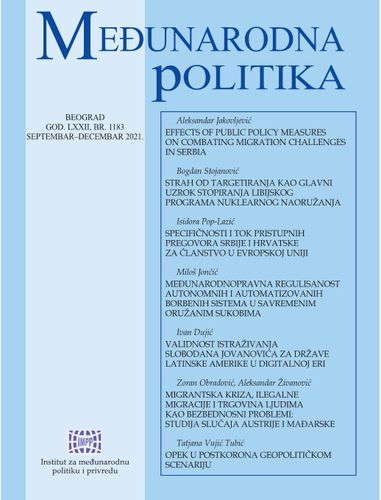Specifičnosti i tok pristupnih pregovora Srbije i hrvatske za članstvo u Evropskoj uniji – implikacije na bilateralne odnose
Specifics and course of the accession negotation of Serbia and Croatia for membership in the European Union - implications for bilateral relations
Author(s): Isidora Pop-LazićSubject(s): International relations/trade, EU-Accession / EU-DEvelopment
Published by: Институт за међународну политику и привреду
Keywords: European Union;Serbia; Croatia;negotiation process; accession negotiations; membership; criteria;bilateral relations;
Summary/Abstract: This paper presents an analysis of the differences between Serbia and Croatia’s negotiation process for EU membership, especially those which have influenced the course and outcomes of the negotiations so far, as well as the bilateral relations between the two countries. Although the negotiations are a nominally suitable framework for resolving open issues between the candidate countries, due to the lack of political will, neither Serbia nor Croatia has used that capacity. Of all the neighbouring countries, Serbia has the most unsolved issues with Croatia (minority issues, missing persons, exiled and internally displaced persons, border demarcation on the Danube, successions andmany others). The dynamics of relations have significantly changed since Croatia became a member in 2013, gaining a much-privileged position in regard to Serbia as a candidate. The main thesis of the paper is that the European Union has at the very least contributed to maintaining the status quo in Serbo-Croatian bilateral relations by raising the question of normalization of relations between Belgrade and Pristina above any other political questions, as well as bilateral relations with the countries in the region. It should be kept inmind that the relations between Serbia and Croatia are not only bilateral, but they also have their implications in Bosnia and Herzegovina, which further emphasizes the importance of improving bilateral relations for long-term peace and stability in the Balkans. The reasons for the Union’s position can be found in its efforts to expand its influence in the region. With its engagement in resolving the Kosovo issue, and due to the reduction of its so-called transformative power, the EU has reached the maximum of its capacities, which is why it has taken a passive position when it comes to bilateral disputes. The double standards sporadically used by the EUwhen it comes to Serbia and Croatia were already visible in the Stabilization and Association Process that precedes the negotiation process, which will be discussed in the first part of the paper. The conditions for membership have not been formally changed, but they have changed in essence. These changes are one of the reasons for Serbia's slow progress towards EU membership, reasons which are basically of a political nature. These changes will be presented in the second part of the paper. In the end, we will try to evaluate whether this action of the EU and the negotiation process itself had a positive or negative impact on the development of good neighbourly relations between the two countries.
Journal: Међународнa пoлитика
- Issue Year: 72/2021
- Issue No: 1183
- Page Range: 53-68
- Page Count: 16
- Language: Serbian

